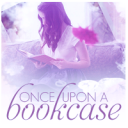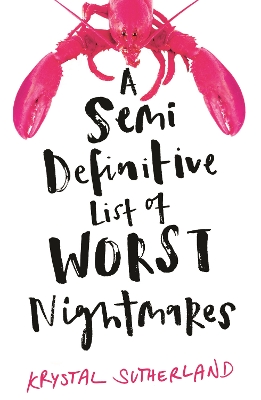
A funny, moving love story about facing fears hand in hand - one snake/spider/potentially unstable fourth-floor balcony at a time. From acclaimed author of OUR CHEMICAL HEARTS, Krystal Sutherland.
Esther Solar's family is . . . unusual. Her father hasn't left the basement in six years. Her brother is terrified of darkness.
Esther isn't afraid of anything - because she avoids pretty much everything. Elevators are off limits, as are open spaces, crowds, family pets, birds, needles, haircuts, dolls and mirrors.
But when Esther is pickpocketed by her cocky old classmate Jonah Walker, Esther and Jonah become surprising friends. Jonah sets a challenge: every week they must work their way through the world's fifty most common phobias. Skydiving, horse riding, beekeeping, public speaking, reptilehouses - they plan to do it all.
Soon their weekly foray into fear becomes the only thing that keeps them tethered to reality, and to each other. But each is keeping a secret from the other, a secret that threatens to rip them apart.
- ISBN10 147140661X
- ISBN13 9781471406614
- Publish Date 5 September 2017
- Publish Status Active
- Publish Country GB
- Imprint Hot Key Books
- Format Paperback
- Pages 368
- Language English
Reviews


Jo
Trigger Warning: This book features attempted suicide, panic attacks, and discusses paedophilia and child murder.
Warning: This review will contain spoilers, as I find certain areas problematic, in regards to my personal experience with anxiety. At the same time, I understand that anxiety can affect those with this mental illness differently, and so while I find this book problematic based on my experience, it's possible this is an accurate representation of anxiety for others. Though it is important to state that this isn't an #OwnVoices novel.
A Semi-Definitive List of Worst Nightmares by Krystal Sutherland is not the book I thought it would be. I was expecting a comedy about people facing their fears. Instead, this is a much more serious book about mental illness.
Everyone in Esther's immediate family has a mental illness. Her dad has agoraphobia, her mum has a gambling addiction, her brother Eugene has depression, and Esther herself has anxiety. It might sound a little unrealistic for a whole family to have mental illnesses, but it's not; everyone in my immediate family, including myself, has a mental illness, too. I found it really interesting how everyone had a different mental illness, and how they affected the others in their family, primarily Esther. She has anxiety, and so she knows there is no quick and easy fix, that their illnesses are not their fault and not something they can control, but at the same time she struggles with how she feels let down by her family. She needs them, but they all have their own thing they're dealing with. She rarely sees her dad, because he is unable to leave the basement after suffering a stroke left him agoraphobic. She used to go and visit him all the time, but seeing him get worse and worse, it just became too hard, so she stopped. She needs her mum to parent, but she spends most of her time with the slot machines, and puts her family in so much debt. She has become superstitious, and her biggest fear is bad luck, so she is also obsessed with good luck charms. They used to be so close but now a rift has formed between them. Esther almost feels like her mum just doesn't care any more. And Eugene's struggle with depression gets worse every day. He is absolutely terrified of darkness, of the monsters he sees in the dark, so the lights in their house are always on, and he always carries torches, matches and flint with him wherever he goes, not feeling safe otherwise. Esther is Eugene's light in the dark, but Eugene is hers, too. With Eugene starting to lose his battle with depression, she finds he can't be there for her like she needs him to be. She's losing her family to mental illness, and despite having one herself, she resents them for it.
And then there is her own anxiety. A long time ago, her granddad met He Who Would Become Death, and his family was cursed. Each and every person in his family would have one great fear, and they would eventually die from what they are scared. Because of this, anything that even slightly scares Esther goes on to her semi-definitive list of worst nightmares, and she avoids it like the plague. If she avoids everything that scares her even a little, she won't work out what her one great fear is, and it can't kill her. But when an old class mate, Jonah, comes back into her life and discovers the list, he challenges her to try and face a different fear each week, in order to remove the curse.
And this is where I had problems. I found the whole issue of the curse and the presence of Death - are they real, are they not? - took away, a little, from the seriousness of the mental illnesses. Except, it doesn't. The problem is with Esther. She believes in the curse, she believes her granddad met death several times, and because of this, she also believes that her family's mental illnesses are down to the curse. Break the curse, and they'll be fine. Curse or not, this is of course ridiculous, and the book does deal with this eventually, but there were a number of times when I just wanted to put the book down, because I found it just too difficult to deal with. I wanted to shake Esther. Her family, every single one of them, needs help, proper medical help, and she's wrapped up in a curse that may be real or not. By facing each of her fears, she thinks she's helping them, when all she's doing is giving herself multiple panic attacks.
Which is another thing I had a bit of a problem with. Jonah's insistence that she face each of her fears, even when she doesn't want to. She has anxiety - she, too, needs help. Jonah is not a medical profession, and forcing her to, each week, do things that trigger her anxiety is just so out of order. I have anxiety, and that it just felt so cruel to me. It may make sense to some, and it is even used in Cognitive Behavioural Therapy. Because the more you avoid something, the worse of an affect it has on you, and your body needs to learn that this thing, this trigger, isn't going to kill you, nothing bad will happen, and so on. But in CBT you are taught methods on how to cope, things are taken slowly, you take baby steps that lead up to the bigger things. You are not just thrown into the deep end and expected to swim. On top of that, I found how quickly Esther got over her panic attacks and was able to do the thing that scared her without a problem unrealistic.
What I also found strange is that when both Eugene and Esther see a therapist together, the therapist give Eugene baby steps to tackle with his fear of the dark and his depression, but yet tells Esther to keep doing what she's doing, though with giving her methods of how to challenge her thoughts and cope with her anxiety. In the author's note, Sutherland explains that those methods came from a TEDX talk from Dr. Dawn Huebner, "Rethinking anxiety: Learning to face fear." But I find it strange that Eugene is given baby steps and Esther is not. This is not my experience of CBT, it is also not something I think I would have been able to do when anxiety had me in grips. As I say above, I understand that those with anxiety experience it differently, and maybe this approach does work for others, so I could be wrong in thinking that diving in head first is not only asking too much, but also really harmful. But I can only go on my experience, and I just didn't find this book realistic in that sense.
Also, I had issue with how Esther's mum and dad get over their illnesses. Esther's mum just decides to go cold turkey with her gambling, to try to do better, without any help whatsoever, and succeeds. Esther's dad, whose body no longer functions as it should due to several strokes, climbs his way out of his basement to get to Eugene when he has that parental instinct that his son is in danger, and from then on, he's fine with being outside. I don't have agoraphobia, nor do I know anyone who has it, but I've read another book where a character with agoraphobia forced herself to go out when she was in danger and absolutely had no other choice, but it wasn't easy, it was unbelievably difficult for her, and her panic attack at the time was so bad, but she wasn't fine after because she managed it once. She still had a mental illness, she still struggled and still needed help. Things were better, yes, but she wasn't "cured". So I find how Esther's mum and dad just snap out of their mental illnesses not only unrealistic, but harmful, because I feel it just perpetuates the stigma that if you really wanted to, you could just stop being mentally ill. No-one can "snap out" of their mental illness. You can't pull yourself together. That's not how it works.
I have really mixed feelings about this book. I really wasn't on board with the curse/Death part of the story, and when it comes to the mental illnesses, some things felt true and realistic (like how Esther dealt with her family's mental illnesses), while others felt problematic and harmful to me. The thing is, I know if I'd read this before I had anxiety, I would have loved it, because it is an enjoyable read. But I just know a bit more now. To be honest, I don't really know what I feel. I'd love to read more reviews by people who have the mental illnesses featured, and see what they thought of it all. I'd maybe suggest you seek them out, too.
Thank you to Hot Key Books via NetGalley for the eProof.

Joséphine
My full book review is up on Word Revel.
_________
October 22, 2017
Initial thoughts: Krystal Sutherland did it again. She wrote another book that made me cry. As expected, A Semi-Definitive List of Worst Nightmares was at times difficult to read. Books that deal with mental illnesses always are and this book doesn't chronicle the struggles of one character but those of an entire family. Sutherland did that with finesse, showing the dark sides, while also weaving in strands of hope.
The relationship between the twins was intense and filled with love. Esther's best friend, Hephzibah, had her own life to deal with but showed up whenever Esther needed her. Jonah was annoying at first, but with each layer that came off, he proved to be a good person.
An interesting but odd character was Death, also a man. His appearances edged A Semi-Definitive List of Worst Nightmares towards magical realism. You never really knew if he was part of a made-up story, if he was imagined or real in some ways.
I wish some parts of this book hadn't been left unresolved but at the end of the day, this book was about Esther facing her fears. What became of others mattered but wasn't necessarily the focus, so it made sense how things ended, which left me with a smile and the belief that things can be better if we're not afraid to seek the help we need when we need it.
_________
Note: I received a finished copy from a local distributor in exchange for an honest review. This does not affect my opinion of the book or the content of my review.

ellieroth
Original de: El Blog del Gato - El Extraño Gato del Cuento
este ibro es como hizo sentir vergüenza ajena de una manera tan palpable y sonora como lo hice esta vez, tuve que bajar mi celular (donde estaba leyendo), taparme la cara y básicamente soltar de esos gritos/chillidos sin mucho sonido… Así como un pterodáctilo.
A Semi-Definitive List of Worst Nightmares es un libro divertido, que toca de manera real lo que es vivir con ansiedad, depresión, sobre lo que es vivir en una familia con predisposición a enfermedades mentales.
Twitter • Tumblr • Tvtime • Goodreads • Instagram • Blog

Kelly
Esther Solar is predestined to be cursed. Her brother is afraid of what dwells within the shadows, her father confined to the basement by anxiety while her mother squanders their meagre possessions to finance her addiction. Grandfather Reginald Solar was a young man during the Vietnam war when he encountered Jack Horowitz, a young soldier recruited to become the reaper and now their lives will subsequently succumb to their fears.
Esther is an eccentric, luminous young woman and an entrepreneur, selling baked delicacies to the teaching and student faculty to finance her escape from the small, podunk town. It's inevitable that Esther too will be consumed by fear. Until Jonah. Jonah Smallwood is a charlatan, an opportunistic young man who has retracted to the nondescript town where he now lives with his alcoholic father and sister. After discovering Esther's list of Worst Nightmares, Jonah challenges Esther to confront her anxiety.
I really enjoyed the adventure of Esther's challenges and the encouragement Jonah provided within their tentative friendship and the acceptance of Esther's family. The familial relationships were interesting. Esther often referred to her mother as an enchanting presence in their lives but now neglects her children, frequently selling their meagre possessions to finance her addiction. Her father is a former veterinarian and now agoraphobic, living within the basement of the family home where his wife and children no longer visit. Esther has a wonderful relationship with brother Eugene, a lovely young man incapacitated by the darkness and monsters who dwell within the shadows. Consumed by her own journey, Esther often neglected Eugene's distress. Although Esther is anxious, I admired her bravery but sensed she distanced herself from her family's predicaments, often appearing to be ignorant.
I enjoyed the overall narrative but found issues with the portrayal of suicide and dialect chosen for characters. In particular, Esther.
Ugh. Sink the scalpel a little deeper next time, oh wise and annoying one.
Although it was remarked as banter, it's incredibly insensitive and may perturb readers who have been diagnosed with a mental health disorder. It changed my perception of Esther and her familial relationships. I was concerned that Esther herself was unable to acknowledge she was unwell, her perception of the addiction and mental illness of her family members manifesting as a curse rather than their distress and disorder.
The diverse character representation was wonderful. Jonah is black, friend Hephzibah is a selective mute of Israeli heritage, her father is a stroke survivor and her grandfather has been diagnosed with dementia. Characters also experiencing addiction and family violence. Although a #LoveOzYA read, the narration takes place within a nondescript American town.
A Semi Definitive List Of Worst Nightmares is an entertaining and charismatic read but not without nuisance.

Bianca
Everyone we let into our lives has the power to hurt us. Sometimes they will and sometimes they won’t, but that’s not a reflection of us, or our strength. Loving someone who hurts you doesn’t make you weak. Sometimes you’re brave if you run. Sometimes you’re brave if you stay. It’s important to know the difference.
— About how we should not let fear keep us from truly living. This was just so beautiful.

Sam@WLABB
I laughed, I cried, and I really loved this book.
Pro: So many awesome and quirky characters to love. Each character had a little quirk that defined them, and Sutherland used them well in the story.
Pro: I laughed so much while Esther and Jonah conquered the list. Jonah and Esther were fabulous enough together, with their chemistry, history, and banter, but the ways they came up with to slay Esther's fears were great.
Pro: I was laughing until I was crying. There are some very serious issues confronted in this book, most being of the mental health variety. I liked that Sutherland tempered the heavy with the light, because there are some really dark and serious moments that would have been overwhelming without that balance.
Con: So, I was a little unprepared for when stuff got real. The story was so light and fluffy, and then I was reduced to tears. This is small con, only because I am a sap and felt ill prepared for the sadness that ensued.
Pro: I was glad that Sutherland had these characters seek help for their illnesses. It's vital that mental illness not be associated with shame or something that you need to deal with in isolation. #ShatteringStigmas
Con: I was scratching my head a little at the ending, and I still am not sure about Death (was he solely in Esther's imagination?), but on the whole, the ending was satisfying, because Sutherland left me with a lot of hope for these characters.
Pro: Esther and her brother shared a strong sibling bond. She ached for him and he ached for her. It was special to be a part of it.
Pro: There was tons of love in this book. Esther's family was damaged and dysfunctional, but we got glimpses of things, that showed how much they loved each other. They were slightly broken, but when push came to shove, they were there for one another.
Overall: A captivating tale that combines some serious issues, humor, mystery, and a little bit of magic, which left me happy and hopeful.
**I would like to thank the publisher for the advanced copy of this book.
BLOG| INSTAGRAM| BLOGLOVIN| FRIEND ME ON GOODREADS

shannonmiz
This is a really cute book, and I quite enjoyed it! There was so much fun stuff happening in this book, and it was incredibly unique. Of course, it deals with some really serious issues, too. There is a big focus on mental health, and Esther and her family suffer from it in droves, but in very different ways. Esther's best friend is selectively mute, and Esther's new-old friend (read about it to see what I mean!) Jonah is dealing with a lot himself, grappling with an abusive parent. So yeah, life hasn't been easy for any of the characters.
But Jonah and Esther try to attack her nightmares in a way that leads to all kinds of fun and shenanigans, including a cat named Fleayoncé Knowles. And the thing is, so much of this book is so, so relatable. I mean, sure, you may not think your family is cursed, and you may not have undertaken this same kind of adventure, but at its core this book is so, so relatable.
It talks about mental illness on a level that makes you know that the author just gets it.
"People got tired of mental illness when they found out they couldn't fix it."
Esther shares her panic over death, which is something I have experiences a lot. There's discussion of the paralysis of anxiety and panic, and of her brother's depression. It's very, very honest, and I loved that. But not only are the mental health pieces relatable, there's just a lot of everyday life stuff that the author throws in to make you feel like you can connect with the characters. There's talk about grandmas trying to "out grandma" each other, for example- which I flagged because yesss, my grandmas did that all the time! Little things like that made me feel like the characters were more genuine and authentic.
The only small downside was that sometimes, the book felt a little long for a contemporary, but overall, I really enjoyed it.
Bottom Line: Great characters, a quirky plot, and an amazing focus on mental health, family, and friendships made me adore this book.
*Copy provided for review
** Quote taken from uncorrected proof, subject to change
